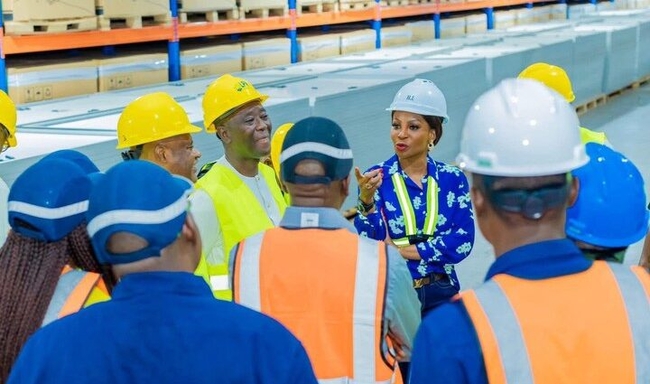The South-South Development Commission (SSDC) says it will partner with LPV Technologies to promote renewable energy access and youth empowerment across the region.
Miss Usoro Akpabio, Managing Director and Chief Executive Officer of SSDC, disclosed this on Monday during a tour of LPV Technologies’ solar panel manufacturing plant in Lagos.
Akpabio said the initiative aligned with President Bola Tinubu’s Renewed Hope Agenda on clean energy transition, local content promotion and regional industrialisation.
She said the engagement followed a previous meeting with the Rural Electrification Agency (REA), where the commission identified LPV Technologies, a solar panel manufacturer, as a potential indigenous partner.
“Part of what we are driving from this visit is skills transfer for our youths.
“Renewable solar energy is here to stay, and it is a cleaner and safer way to power our environment,” she said.
According to her, renewable energy will help address power challenges in the South-South, supporting key sectors such as health, education and social services.
Akpabio added that SSDC would establish solar training hubs in collaboration with LPV Technologies to build capacity for solar installation, maintenance and production.
“The advantage of training youths through local players like this is accessibility and sustainability.
“It will also reduce dependence on imported solar products,” she said.
Akpabio noted that supporting local manufacturers would cut import costs and enhance logistics within the region.
She stressed that LPV Technologies met global standards in production and quality assurance.
“I am impressed with the level of technology deployed here; every product has a 25-year lifespan warranty; this shows the company’s commitment to quality,” she said.
In his remarks, Mr Nzan Ogbe, Managing Director of LPV Technologies, said the partnership would support SSDC’s efforts to expand energy access in rural communities.
Ogbe said the company’s current production capacity stood at 100 megawatts, with plans to increase to 300 megawatts within six months.
The South-South Development Commission (SSDC) says it will partner with LPV Technologies to promote renewable energy access and youth empowerment across the region.
Miss Usoro Akpabio, Managing Director and Chief Executive Officer of SSDC, disclosed this on Monday during a tour of LPV Technologies’ solar panel manufacturing plant in Lagos.
Akpabio said the initiative aligned with President Bola Tinubu’s Renewed Hope Agenda on clean energy transition, local content promotion and regional industrialisation.
She said the engagement followed a previous meeting with the Rural Electrification Agency (REA), where the commission identified LPV Technologies, a solar panel manufacturer, as a potential indigenous partner.
“Part of what we are driving from this visit is skills transfer for our youths.
“Renewable solar energy is here to stay, and it is a cleaner and safer way to power our environment,” she said.
According to her, renewable energy will help address power challenges in the South-South, supporting key sectors such as health, education and social services.
Akpabio added that SSDC would establish solar training hubs in collaboration with LPV Technologies to build capacity for solar installation, maintenance and production.
“The advantage of training youths through local players like this is accessibility and sustainability.
“It will also reduce dependence on imported solar products,” she said.
In his remarks, Mr Nzan Ogbe, Managing Director of LPV Technologies, said the partnership would support SSDC’s efforts to expand energy access in rural communities.
Ogbe said the company’s current production capacity stood at 100 megawatts, with plans to increase to 300 megawatts within six months.
Ogbe added that LPV Technologies had achieved its first export of Nigerian-made solar panels to Ghana and was expanding into Togo, Cameroon and Benin Republic.
He said the company’s local production model was designed to shorten supply chains and ensure affordable, high-quality solar solutions for Nigerian consumers. (NAN)


